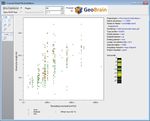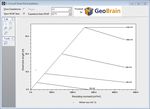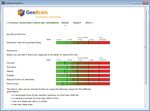D-Sheet Piling Design of diaphragm and sheet pile walls - Deltares
←
→
Page content transcription
If your browser does not render page correctly, please read the page content below
Design of diaphragm and sheet pile walls
D-Sheet Piling
General
D-Sheet Piling is a tool used to design retaining walls and
horizontally loaded piles. D-Sheet Piling’s graphical interactive
In The Netherlands, an extensive design procedure interface requires just a short training period, allowing the user to
focus their skills directly on the input of sound geotechnical data
for sheet pile walls has been developed. Besides the
and the subsequent design of the wall or single pile.
partial safety factor concept of the Eurocode 7, the
Besides features generally found in other retaining wall design
Dutch National Annex offers a clear step-by-step
software, D-Sheet Piling offers several specific design features:
design process, checking against failure, verifying
• Automatic interpretation of CPT´s
stability and allowing optimization of the design.
All geotechnical parameters needed for input are interpretated
Initiated by the Dutch Ministry of Public Works, from CPT data.
the development of a software tool for the analysis
• Length optimization
and design of retaining walls started back in 1988. The critical length for the retaining structure is checked
automatically by reducing the length of the wall step-by-step,
Since its initial development, many improvements
until instability or unacceptable displacement occurs.
have been made to suit the needs of geotechnical
• Safety
designers and consultants.
D-Sheet Piling verifies the safety of the sheet pile wall for selected
construction stages by applying partial safety factors defined
according to the Eurocode 7, including Eurocode annexes for The
The stability of the majority of all Dutch retaining Netherlands and Belgium. The user can also define their own
partial safety factors.
walls has been checked using methods and tools
developed by Deltares (formerly known as GeoDelft), • Anchor wall stability
The stability of the anchor wall is checked according to the Kranz
the leading Institute for Delta Technology. In 2002,
theory.
GeoDelft founded Delft GeoSystems. Previous
• Overall stability
releases of D-Sheet Piling were named MSheet. Since
A Bishop slip-circle analysis is used to check the overall stability
the formation of Deltares in 2008, Delft GeoSystems of the wall and soil.
has become Deltares systems. Deltares systems
• Feasibility comparison
makes these tools available in English for the Projects can be compared to experiences of real projects and
guidelines to help to ascertain if installation/vibration of a sheet
international geotechnical engineering community.
pile wall of this type is feasible.
Deltares systems tools come with a comprehensive
manual and extensive validation and verification Passive slip Active slip
plane plane
reports.
E0 T
L
H
Ea
Er
4 2
H T
Arc tan
L cos
Rotation point
Stability of anchor for short anchor (Kranz theory)D-Sheet Piling comes as a standard module, which can be extended horizontal soil stress σH
further with other modules to fit more advanced applications:
• D-Sheet Piling Standard module (Earth pressure coefficients)
• Culmann module arctan k4
• Eurocode 7 Verification module passive: Kpσv
• Single Pile module arctan k3
• Feasibility module. neutral: K0σv
2[%] 3[%] 100%
active: Kaσv arctan k2
1[%]
Standard module (Earth pressure coefficients)
The standard module is intended for the analysis of retaining wall arctan k1 horizontal displacement
structures. It allows input of straightforward projects and provides Stress displacement diagram
tabulated and graphical output of results both on-screen and in a
report. Some specific features include:
Modelling of groundwater and water pressures
Geometry input • Hydrostatic pore fluid pressure from the input of a phreatic surface.
• Graphical user interface. • Additional excess pore pressures.
• Horizontal soil layers.
• Input of sheet pilings from an extensive library (Arcelor, Hoesch, Construction stages
Larssen, Chaparral). All settings relevant to staged construction are available in a
• Wizard for fast input of combined walls (king piles). spread sheet like window. This allows for fast control and provides
• Anchors, including pre-stressing force and maximum loading overview. The following changes can be made between stages:
force (yielding). • excavation or elevation of soil
• Struts, including pre-compression force and maximum loading • adding or removing loads
force (buckling). • adding or removing anchors and struts
• pre-stressing or pre-compressing in anchors and struts
• alteration of the water table.
Staged excavation with struts
Inputted geometry
Loading input
• Uniform distributed loads at ground level.
• Line loads directed perpendicularly to the wall, moments, Output
variable normal force along the beam axis. Input and output tables, graphs and a report are available for
• CPT input from GEF-file or DINO via GEFPlotTool database. printing, viewing and for export with standard Windows applications
through the Windows clipboard. Graphs are available for:
Soil modelling • displacements
• CPT interpretation model. • bending moments
• Subgrade reaction model. • shear forces
• Earth pressure coefficients (Ka, Ko and Kp). • pore pressures and soil stresses along the beam axis
• Elasto-plastic modelling of loading/unloading. • results of length design and overall stability checks can be viewedStresses in sheet pile wall Eurocode 7 partial factors
• reports can be generated for ordinary and verification calculations, • Checking forces in anchors against allowable values according to
containing input and output data, graphs and summaries slip surface theory.
• information can also be exported to D-Geo Stability for more • Detailed verification report.
comprehensive stability analysis.
Single Pile module
Culmann module • Soil layers and water pressures as for sheet pile walls.
• Refined calculation of earth pressure coefficients. • Ability to input piles with different cross-sections and stiffnesses
• Non-horizontal ground level. at different depths.
• Non-uniform surcharge loads. • Connections to foundations and other restraints modelled by
• Initial stage for input of non-horizontal initial ground level or supports resisting rotation and/or translation.
initial surcharge avoiding deformation in the wall due to their • Loading by horizontal forces, forces along the pile axis and
pre-existence. moments.
• Alternatively, loading by soil displacement. This option is
especially useful for horizontally loaded piles where the
displacement of soil due to external loading results in pile bending.
Input window for soil parameters
Eurocode 7 Verification module
• Overall stability check using a slip circle according to Bishop.
• Ability to apply partial factors to loads, material properties, soil
and water levels, all according to the Eurocode 7 general setup
and according to the National Annexes for The Netherlands and
Belgium, or according to user specified partial factors.
• Application of different safety classes/partial factor sets to
different construction stages.
Vibrating mooring pilesFeasibility module works. Hundreds of project experiences concerning the driving of
During the design of a sheet pile wall, the stability of the sheet pile walls and piles were therefore received for study. The
construction is checked according to guidelines like the Eurocode. Feasibility module provides access to these experiences. Based
In practice, this does not guarantee that the project is feasible. on the relation between the sheet pile length and the resisting
This may depend on many other local factors, among which the moment the user is confronted with stored experiences. These may
equipment used during construction. For this purpose, the use help the users to predict the feasibility of their projects.
of the Feasibility module helps the user to evaluate the project’s
feasibility by comparison with experiences. Three sources are GeoBrain Foundation technics predictions
available in the Feasibility module: The GeoBrain Foundation technics predictions model introduces
expert knowledge based on input parameters used in D-Sheet Piling.
NVAF lines The prediction model will indicate the feasibility of the project and
The Dutch Society for Foundation Engineering Contractors provide suggestions for practical improvements.
(NVAF) has written guidelines to prevent sheet pile driving failure.
The Feasibility module supports some NVAF graphs on pile driving
failure, using vibrators. These graphs are based on the relation
between the sheet pile length and the resisting moment. Depending
on the equipment used, several graphs exist giving the user an
indication of the feasibility.
Visualization of GeoBrain predictions in D-Sheet Piling
Interaction with other Deltares systems tools
The geometry from D-Sheet Piling can be directly exported to
NVAF experience lines D-Geo Stability for more detailed stability analysis.
GeoBrain Foundation technics experiences Support
In 2002, GeoDelft started a project called GeoBrain which aim was Deltares systems tools are supported by Deltares. A group of
to develop a prediction model for the feasibility of foundation 70 people in software development ensures continuous research
and development. Support is provided by the developers and if
necessary by the appropriate Deltares experts. These experts can
provide consultancy backup as well.
On-line software (VMware)
All popular geotechnical Deltares simulation products are available
over the internet via our Online Software service (Software as
a Service (SaaS)). An internet connection and subscription is
sufficient for worldwide access. Billing is according to the actual
use and subscription costs per quarter.
Visualization of GeoBrain experiences in D-Sheet PilingPO Box 177 T +31 (0)88 335 81 88 2600 MH Delft software@deltares.nl Boussinesqweg 1 www.deltares.nl/software 2629 HV Delft onlinesoftware.deltares.nl The Netherlands
You can also read


























































